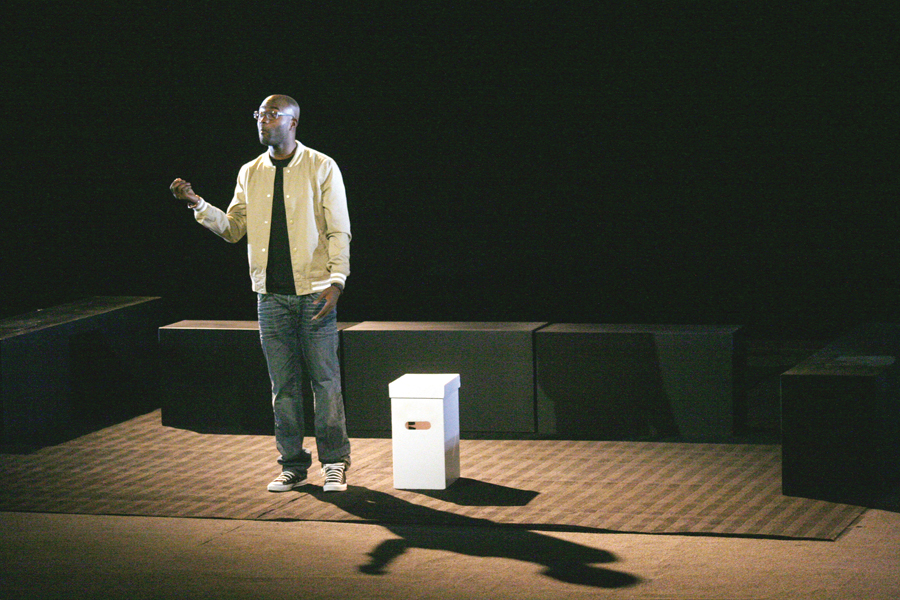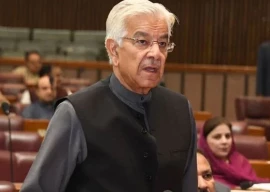
The Napa (National Academy of Performing Arts) International Theatre festival is getting more unpredictable and interesting with each passing day. If the young and enthusiastic Theatre Village from Nepal created a visually captivating stage, then Fuel Theatre from England barely relied on the nuances of stage and put up a compelling story telling session.
The question however is, whether The Black T-shirt Collection (TBTSC) by Fuel Theatre is a dramatic reading or a conventional theatre play? This question even popped up when Naseeruddin Shah performed Ismat Apa Kay Naam. After witnessing a rather theatrically inefficient but slick production of TBTSC, one can easily classify it as a potent and powerful dramatic narration session and not a theatre play. Compared to Ismat Apa Kay Naam, which was also in a way a dramatic reading session, TBTSC can be considered a theatre play when judged along TBTSC for the value adding and drama enhancing use of stage space. An analogy can be drawn between these two plays akin to similar cuisines prepared by chefs with a different choice of topping.

That, however, doesn’t take anything away from the jarring impact Inua Ellams’s dialogue and performance had on an almost houseful audience at Napa. An African by origin, Ellams tells the story of Mathew and Mohammad — two Nigerian foster brothers who, after facing their fair share of social repercussions, have their humble beginnings in a capitalist world with a T -shirt business. But much like how Freud says, “The ultimate goal of life is death,” even their business, which in a way gave them a new life in a foreign land, came to a tragic end in a sacrifice of trust, compassion and many other values that the African expats are known for. It was a soul-wrenching, mind-numbing and blood-soaked saga for the characters and equally pressing, but very predictable for the audience.
The narrative is tightly knit and exceptionally performed by Ellams. His accent did become a major deterrent at times in understanding some of the subtleties of dialogue, but he still managed to generate the ‘Ooohs’ and ‘Awws’ from an audience that is not used to comprehending or creating ideas in English. This also had a lot to do with the fact that the issues that the story was highlighting are not alien to the theatre going audience of Karachi. After all, the easy availability of pirated DVDs and availability of cable television has given us an insight into the prevailing and historic issues of the Western culture, especially the ones being faced by Africans. This is why the very direct social commentary on sectarianism, racism, homophobia and poverty at large didn’t come as much of a surprise to the audience. One knows how to expect the predictable gloomy end to a gorgeous beginning of an African saga.
The graphic novel like sketches that were projected on screen did create an effect in the beginning, but it all seemed forced when Ellams himself became the sole torchbearer of the narrative. The sketches were beautiful, but didn’t make sense in the greater whole of individual aesthetic elements. They only took one away from what Ellams was saying. This performance was written like a listening experience and the story that was being read was full of strong visual imagery itself, so any other visual aid ended up becoming more of a distraction than a theatrical experience.
After receiving a standing ovation from the audience, Ellams spoke to The Express Tribune. He elaborated on why his script has the clichés that are generally associated with African literature and why it is difficult to move on as a writer.
“I think you can only stop writing about something when it no longer bugs you. Since it is still an issue, you need to find ways to express it and I think that’s why we keep coming back to the same issues. There is a saying that history happens in circles and it happens because we forget and it needs to happen until we do not forget and do something about it instead. So all topics of discrimination are still happening and we can’t stop writing about them because we face them every day,” said Ellams.
From the audience’s response, Ellams thought that most of them had understood the crux of the story, which he believes is good enough when a play is talking about so many pertinent issues at one time.
“The problem with politics and a lot of our leaders is that sometimes they tell us what to do. I am a writer and my job is not to tell the people what to do, it is just to show people who they are.” Ellams sounded like Saadat Hasan Manto, who once said that he shows the society what it is and it’s not his job to put clothes on the society. It’s the dressmaker’s job.
On a closing note, Ellams said, “I think if you see Mathew and Mohammad as just normal people who go through difficult situations then you might think, ‘Is that fair? What can we do to make the situation simpler for them?’ If in the end of the show you end up thinking about what happened to them, then that’s it, my job is done.”
Published in The Express Tribune, March 14th, 2014.
Like Life & Style on Facebook, follow @ETLifeandStyle on Twitter for the latest in fashion, gossip and entertainment.
COMMENTS (1)
Comments are moderated and generally will be posted if they are on-topic and not abusive.
For more information, please see our Comments FAQ
1734609344-0/Untitled-(69)1734609344-0-405x300.webp)
1721739746-0/BeFunky-collage-(12)1721739746-0-165x106.webp)
1734607785-0/Untitled-(67)1734607785-0-165x106.webp)

1734606787-0/Untitled-(65)1734606787-0-165x106.webp)

1732012115-0/Untitled-design-(14)1732012115-0-270x192.webp)
1734606611-0/Express-Tribune-(8)1734606611-0-270x192.webp)



1734468458-0/Copy-of-Untitled-(50)1734468458-0-270x192.webp)

1734511806-0/Untitled-design-(5)1734511806-0-270x192.webp)









Not African American! This guy was of Nigerian origin from England. So African English perhaps